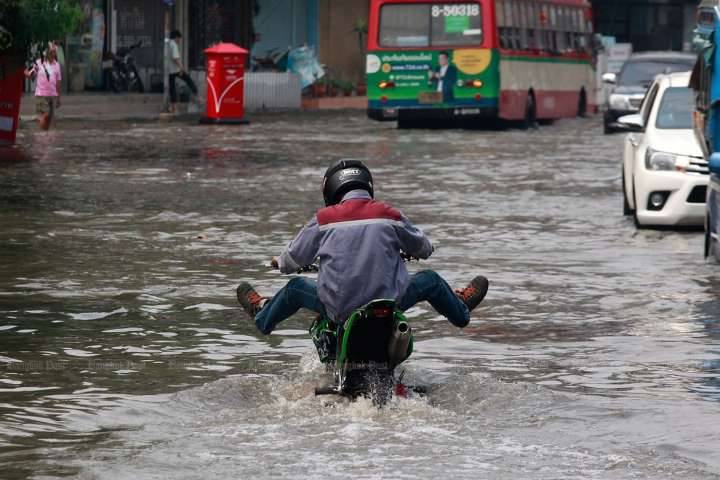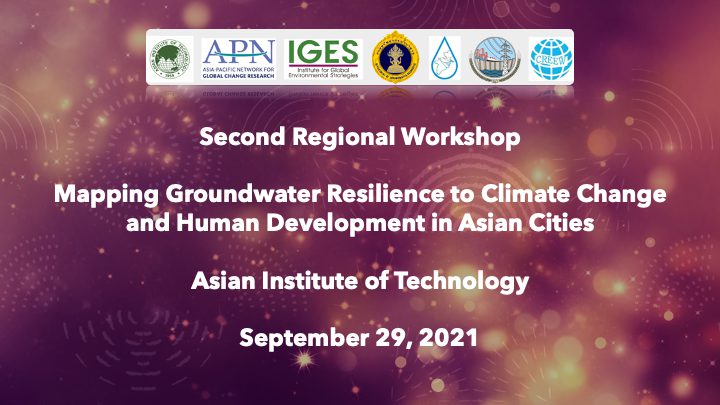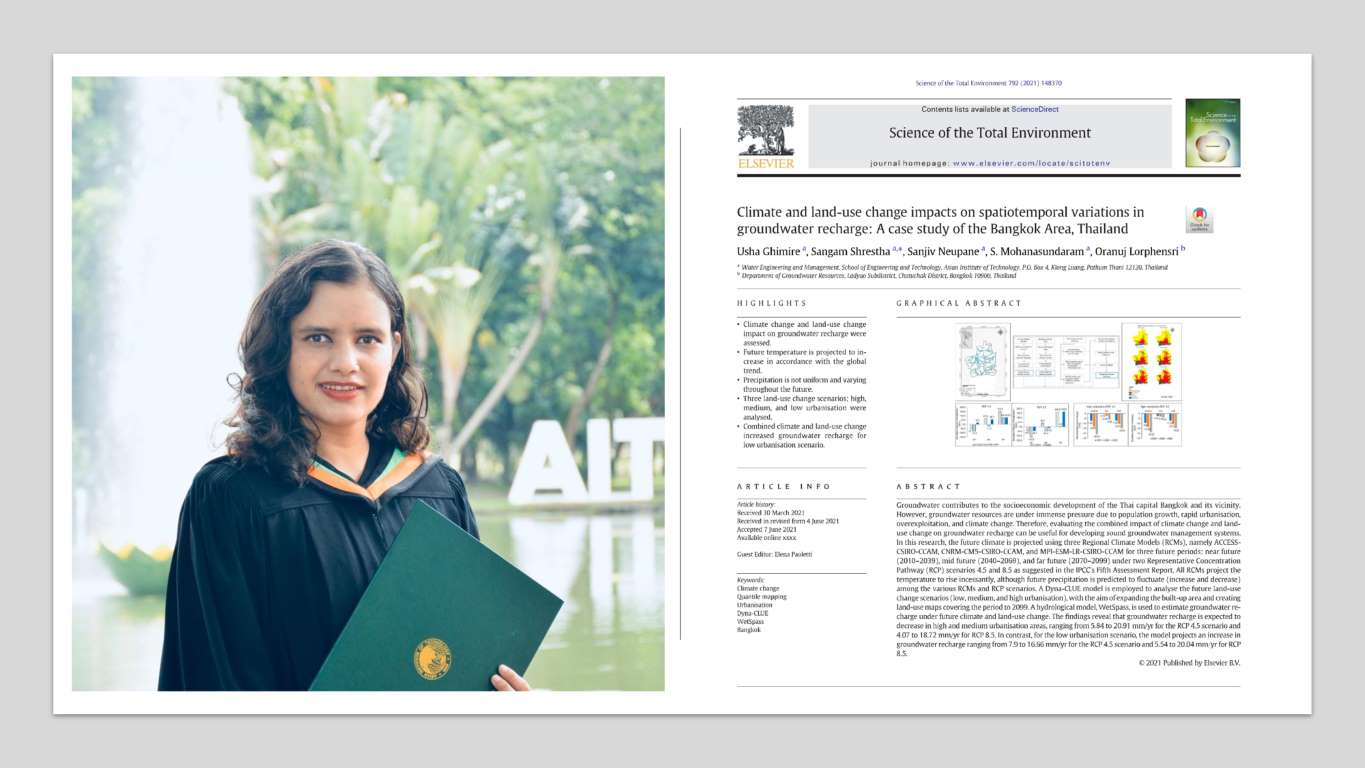16-18 October 2019 – An ‘International Symposium on Climate Change Impacts, Vulnerability and Adaptation: Asian Perspective’ organized by the Asia-Pacific Network for Global Change Research (APN) and the Asian Institute of Technology (AIT) from 16 ‒ 18 October 2019 was successfully concluded at the AIT Campus, Thailand. Sixteen (16) project leaders/members of APN supported projects from 11 countries shared their project outputs and developed high quality scientific research papers for a special issue in a high impact factor journal, Environmental Research (Elsevier).
Dr Sangam Shrestha, Associate Professor and Program Chair of the Water Engineering and Management program of AIT opened the symposium by welcoming all participants providing a briefing of the motivation to organize the symposium. Prof. Mukund S. Babel, Professor of the Water Engineering and Management program of AIT provided a brief introduction and importance of the symposium displaying the diverse participation in the event. The opening session then witnessed the self-introduction of all the invited participants, early-career researchers and support staff.
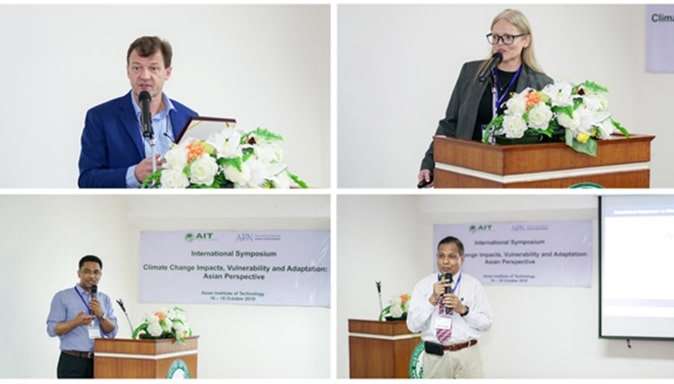
Prof. Trau (top left), Dr Stevenson (top right), Dr Shrestha (bottom left) and Prof. Babel (bottom right) providing opening presentations.
Prof. Dieter Trau, Dean of AIT’s School of Engineering and Technology, delivered welcome remarks to all the participants and highlighted the continued collaboration between AIT and APN. He also emphasized the importance of the symposium in developing high quality research papers for the Asian region in the context of climate change, its impacts, the extent of damage and providing solutions with different adaptation measures. Dr Linda Anne Stevenson, Head of Division of Communication and Scientific Affairs, APN expressed her immense appreciation in meeting 16 project leaders/members of APN-supported projects in one venue and having a joint review and discussion of projects outputs. She also welcomed all the participants and provided the objectives of the symposium, which is to increase the visibility and impact of APN research and capacity building projects by compiling and publishing the outputs of APN-supported projects for the attention of academia and the policy making arena.
The opening session ended with the presentation of Dr Shrestha where he familiarized participants with IPCC’s AR6 Climate Change 2021: Impacts, Adaptation and Vulnerability. Moreover, he also delivered the guidelines and timelines for Elsevier’s Environmental Research journal for the special issue ‘Climate Change Impacts, Vulnerability and Adaptation: Asian Perspective’. This special issue will be a compilation of all products developed from the symposium.
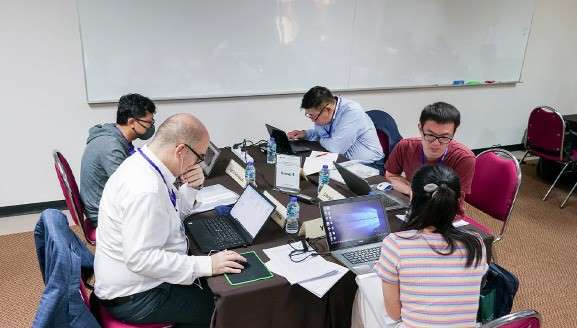
Participants engagement during the workshop
Day 1 (October 16) of the symposium comprised three technical sessions chaired by Dr Shrestha, Dr Stevenson and Prof. Babel, respectively. Fifteen different papers were presented and discussed by all participants.
Day 2 (October 17) was divided into two technical sessions 4 and 5, which consisted of manuscript review and discussion on the review. Five different groups consisting of three participants were developed in such a way that each participant reviewed two manuscripts of the group. In session 4, each participant reviewed two manuscripts and provided written comments whereas in session 5, each author of the manuscripts within the group met with two of their peer reviewers face-to-face and discussed the comments provided by them. Dr Salvatore Virdis and Dr S. Mohana Sundaram, Associate Professor and Assistant Professor at AIT, respectively, also joined two different groups as independent reviewers. The second day of the symposium ended with a plenary discussion on the status of each reviewed manuscript highlighting areas for improvement.
Day 3 (October 18) consisted of the final two technical sessions (6 and 7), which included manuscript improvement and discussion on review and finalization of draft manuscript. In the first half of the final day, each author worked on the improvement of their manuscripts based on the reviewers’ comments, whereas on the second half of the day, authors of the manuscript discussed with two reviewers on further improvement.

